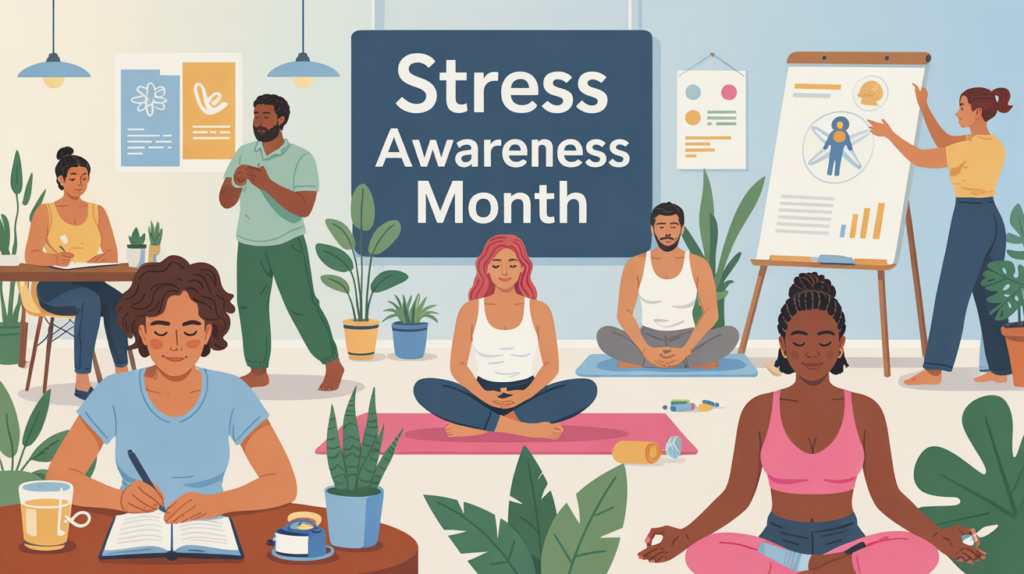Stress Awareness Month is observed every April as a dedicated time to understand how stress affects our lives and what we can do about it. With the world growing more fast-paced and demanding, learning effective stress management techniques is essential to preserving mental and physical well-being.
This observance offers a timely opportunity to reflect on our stress levels, discover helpful resources, and participate in stress awareness month activities that promote resilience, recovery, and mental clarity.

What Is Stress Awareness Month?
Since 1992, Stress Awareness Month has aimed to educate the public about the causes and consequences of stress while offering support and strategies for stress relief.
-
Encourages proactive mental health care
-
Promotes education around stress triggers and responses
-
Offers opportunities for individuals and organizations to engage in stress awareness month activities
Why Stress Management Matters
Stress is more than a feeling—it can cause serious disruptions to your daily life. Understanding how to identify and manage it can lead to better health, relationships, and productivity.
-
Short-term stress can impact your focus and mood
-
Chronic stress can increase the risk of heart disease, depression, and burnout
-
Effective stress management reduces these risks and improves overall well-being
Stress affects how the body and mind operate, often leading to mental health issues like anxiety.
Recognizing its underlying science and causes can help manage its impact on daily life. This includes the role of hormones in stress responses and common factors triggering stress.

The Science of Stress
Stress activates your body’s fight-or-flight system, releasing cortisol and adrenaline. While helpful in emergencies, long-term exposure to these hormones can damage your health.
Common Causes of Stress:
-
Job pressure or burnout
-
Financial strain
-
Family and relationship issues
-
Major life transitions
-
Health concerns
Recognizing these triggers is the first step in reducing their impact.

Stress Awareness Month Activities to Try
Looking for ways to get involved? Here are practical and meaningful activities for individuals and organizations:
For Individuals:
-
Start a daily mindfulness practice
-
Create a self-care routine
-
Keep a stress journal
-
Unplug from social media for a day
-
Try guided meditation or breathwork
For Workplaces:
-
Host a stress-relief workshop
-
Offer virtual yoga or meditation sessions
-
Encourage wellness breaks or walking meetings
-
Share stress management tips via internal emails or intranet
For Communities:
-
Organize a stress relief fair or resource booth
-
Promote awareness with posters and flyers
-
Partner with local therapists for Q&A panels or events

How to Recognize the Signs of Stress
Identifying stress early can prevent it from becoming chronic.
Symptoms to Watch For:
-
Headaches and muscle tension
-
Fatigue or poor sleep
-
Irritability or mood swings
-
Anxiety or depression
-
Trouble focusing
Stress Management Tips That Work
Managing stress effectively takes a multi-faceted approach. Try combining lifestyle changes with mental health techniques for lasting impact.
Everyday Stress Management Techniques:
-
Deep breathing exercises
-
Mindfulness meditation
-
Physical activity (e.g., walking, yoga, dance)
-
Listening to calming music
-
Engaging in hobbies
Healthy Lifestyle Habits:
-
Prioritize 7–9 hours of sleep
-
Eat nutrient-rich meals
-
Limit sugar, caffeine, and alcohol
-
Stay hydrated
-
Create a consistent daily routine
Time Management Tools:
-
Use digital planners or task apps
-
Set clear, achievable goals
-
Break large tasks into smaller steps
-
Schedule breaks and downtime

Advanced Coping Strategies for Long-Term Relief
Mindfulness & Meditation
Mindfulness practices help regulate emotions and reduce overthinking. Daily meditation—even just 5 minutes—can calm the nervous system and improve clarity.
Support Systems & Groups
Whether it’s a therapist, a peer support group, or a close friend, connection plays a huge role in how we handle stress.
Professional Therapy
Therapists can help uncover root causes of chronic stress and teach you CBT (Cognitive Behavioral Therapy) or other approaches to regain balance.
Resources Available During Stress Awareness Month
Key Organizations:
-
Local counseling centers or wellness coalitions
Educational Tools:
-
Webinars and workshops
-
eBooks and downloadable guides
-
YouTube channels focused on mindfulness and mental health
-
Printable stress trackers and goal planners
FAQs About Stress Awareness Month
What’s the goal of Stress Awareness Month?
To educate the public on stress, encourage conversations about mental health, and promote healthy coping tools.
What is the 2025 theme?
Resilience and Recovery, focusing on bouncing back from stress and building lasting stress management habits.
What color represents Stress Awareness Month?
Blue—symbolizing calmness and mental clarity.
When is National Stress Awareness Day?
It’s observed on the first Wednesday in November.
How can I get involved in Stress Awareness Month?
Practice self-care, attend workshops, post resources on social media, or support coworkers and friends under stress.
Final Thoughts
Stress Awareness Month serves as a powerful reminder to check in with ourselves and those around us. Whether you’re managing everyday stressors or dealing with long-term anxiety, you’re not alone—and support is always available.
By exploring stress awareness activities, using practical stress management techniques, and accessing available resources, you can take meaningful steps toward a healthier and more balanced life.
Take a deep breath—your wellness journey starts today.


